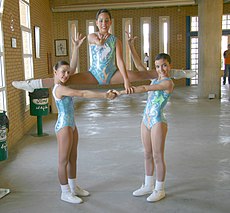Loading AI tools
Type of gymnastics From Wikipedia, the free encyclopedia
Aerobic gymnastics or sport aerobics is a competitive sport originating from traditional aerobics in which complex, high-intensity movement patterns and elements of varying difficulty are performed to music.
This article needs additional citations for verification. (November 2024) |
 A sport aerobics team | |
| Highest governing body | Fédération Internationale de Gymnastique |
|---|---|
| First contested | United States, 1980's |
| Characteristics | |
| Contact | Not with opponents |
| Mixed-sex | Yes |
| Type | Gymnastic sport |
| Presence | |
| Country or region | Worldwide |
| Olympic | No |
| World Games | 1997 – 2021 |
The performance area is 7 metres (23 ft) square for juniors or 10 metres (33 ft) square for adults and for aero dance and step.
In International competition there are 9 different events: Individual Women, Individual Men, Mixed Pairs, Trios, Group (five athletes), Step and Dance (both two last categories have eight athletes). The last four are regardless of the genders of the athletes.
The performances are made up of four groups of elements. The routine must be performed entirely to music.
In the competition, there are specific requirements regarding the outfit, the number of elements performed, the number of lifts performed, the number of elements performed on the floor and much more.
Performances are scored in the following areas: artistry, execution, difficulty and the chair of the judges panel determines the final score deductions based on deductions that change with each code of points. If the combined scores are the same, the tiebreaker is the team with higher execution scores.
The long-term ultimate goal of the sport of aerobic gymnastics is to be included in the Olympic Games.
The National Aerobic Championships was a competition of aerobic gymnastics started in 1984 in the United States. Founded by Sports Fitness International, it was the first major championship in the sport predating the Aerobic Gymnastics World Championships by 11 years. From 1988 onwards the individual events were separated into individual men and women, mixed pair and team. The sport became popular around the world after it gained popularity in the US when major championships were aired on ESPN during the height of the fitness movement in the US. From 1995 through 2019, the sport experienced growth in Eastern Europe, China, Argentina, Mexico, Canada and Australia among other countries but never grew in the US as the creators of the sport in the USA struggled to transition the focus from fitness to gymnastics. As other countries have blended successfully with their gymnastic federations, the US, where the sport was created, was not successful in making that transition. USA Gymnastics does not officially acknowledge the sport as a gymnastic discipline even though the international governing body, the FIG, does so.
The last event coordinated by Howard and Karen Schwartz for ANAC and the countries still members of ANAC, after the rest of the world moved to the FIG, was held in 2019. In the rest of the world, the sport continues to evolve with numerous successful events being held with high-level athletes, judges and coaches being present.
The competitive aerobic gymnastics are governed by the Fédération Internationale de Gymnastique (FIG). The FIG designs the Code of Points and regulates all aspects of international elite competition. Within individual countries, gymnastics is regulated by national federations. In 1995, the FIG recognised sport aerobics as a new competitive gymnastics discipline, organised judges and coaches courses and launched the 1st Aerobic Gymnastics World Championships in Paris (34 countries). In 1997, the IWGA (International World Games Association) included Aerobic Gymnastics in its programme of the 5th World Games (Lahti, Finland).[1] Since 1999 The European Union of Gymnastics has been conducting Aerobic European Gymnastics Championships in every odd year.[2] Leading nations who have provided World Medallists are: Australia, Brazil, Bulgaria, Chile, China, France, Hungary, Italy, Japan, Korea, New Zealand, Romania, Russia and Spain.[1]
FISAF stands for the Federation of International Sport Aerobics and Fitness. It is an independent, not-for-profit, international sport aerobics association with over 30 member countries around the world.
The sport was added in the biannual Idol Star Athletics Championships for Lunar New Year, 2017 as a male team equivalent to the female individual rhythmic gymnastics, and the scores are given in accordance to FIG Standards. Seventeen (9.8 Technical+9.3 Execution-0.0 Penalty) and ASTRO (9.75+9.45-0.1) both scored 19.10 out of 20.00, but since ASTRO scored higher in Execution, ASTRO won the inaugural event.[3]
In the American sketch comedy television series Key & Peele, the duo parodies the '80s video footage of the National Aerobic Championship in a sketch showing one of the aerobic dancers experiencing a meltdown while dancing to the championship theme song.[4]
Seamless Wikipedia browsing. On steroids.
Every time you click a link to Wikipedia, Wiktionary or Wikiquote in your browser's search results, it will show the modern Wikiwand interface.
Wikiwand extension is a five stars, simple, with minimum permission required to keep your browsing private, safe and transparent.